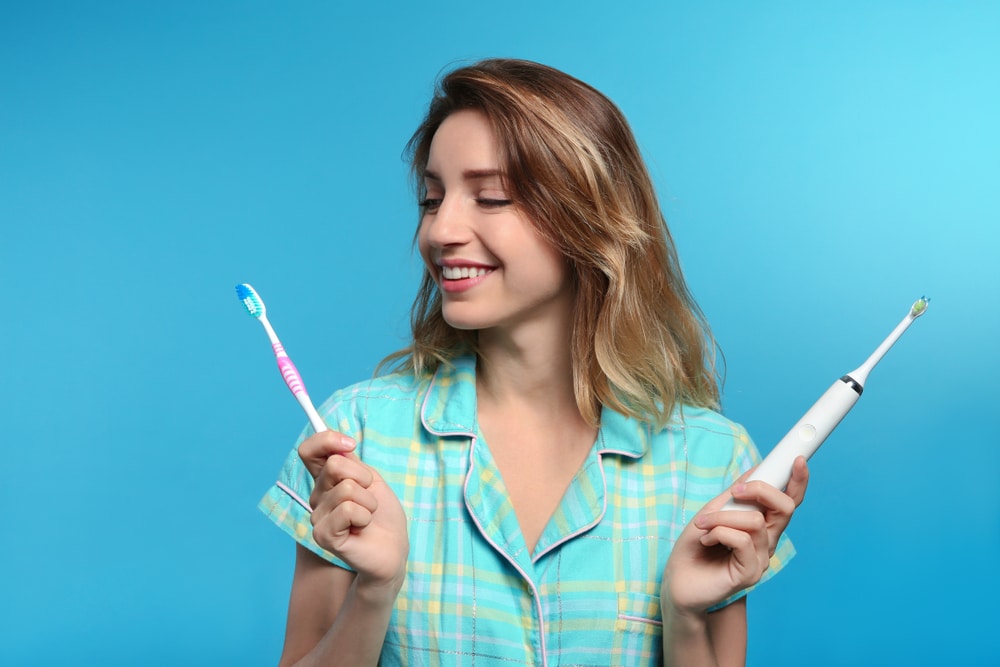
When it comes to maintaining your oral health, your toothbrush should be your most trusted tool. It’s a simple but essential part of a daily dental routine that keeps your mouth in top shape. Regular brushing helps rid your teeth of sugars, food particles, and pesky bacteria that can cause a range of oral issues, from cavities to infections. It’s also your first line of defense against plaque buildup, which can lead to gum disease if left unchecked.
With a myriad of toothbrush options on the market, choosing the right one might seem a little mystifying. However, it’s really as simple as finding a brush that you’ll actually use. For most people, that means opting for a toothbrush with soft bristles to protect enamel and a compact brush head to tackle those hard-to-reach spots. But as for electric versus manual toothbrushes, it’s primarily about personal preference.
Here, we’ll weigh the pros and cons of each so you can make a better, more informed decision about the way you’ll brush your teeth.
Electric toothbrushes, also known as “power toothbrushes,” feature a bristled head powered by a motor within the handle, offering oscillating or vibrating movements. While widely recommended by dentists, it’s important to use electric toothbrushes correctly to avoid potential gum damage and ensure optimal oral health.
Enhanced precision, cleaning, and control. Electric toothbrushes provide more precise cleaning as compared to manual brushing. The automated movement of the brush head is designed to navigate the contours of the teeth effectively, resulting in a thorough cleaning experience.
Ideal for certain individuals. Electric toothbrushes can be particularly beneficial for children and those who struggle with proper brushing techniques. Some models come with features like timed reminders to encourage longer brushing sessions, coupled with multi-directional bristle movement for comprehensive cleaning.
Unintentionally using excessive force. Users prone to aggressive brushing may inadvertently apply too much pressure with electric toothbrushes, potentially leading to gum recession. The toothbrush’s built-in pressure can exacerbate this issue.
Cost. Electric toothbrushes can be expensive, both upfront and in the long run. Expenses include battery replacements or the cost of electric charging, as well as regular head replacements.
Electric toothbrushes come in three primary types: sonic, oscillating, and rotary.
While each type is effective, rotary brushes generally feature smaller heads.
To prevent damage to the teeth and gums, it’s essential to use the correct brushing technique with electric toothbrushes.
Manual toothbrushes eschew electronic bells and whistles and rely solely on technique for effectiveness.
Cost-effective. Manual toothbrushes offer budget-friendly options for dental hygiene.
User-friendly. Their simplicity makes them easy for users of all ages.
Versatile. With a plethora of options available, including various brush head shapes and sizes, manual toothbrushes cater to diverse preferences.
No charging required. Unlike their electric counterparts, manual toothbrushes require no charging, ensuring they’re always ready for action.
Portable. Their compact and lightweight design makes them perfect for travel or on-the-go use.
Limited cleaning results. Improper brushing techniques, often involving horizontal back-and-forth movements, may prevent optimal cleaning.
Reduced plaque removal. Without the vibration advantages of electric brushes, manual toothbrushes may struggle to remove plaque and debris as effectively.
Manual toothbrushes primarily differ in bristle orientation, with zig-zag bristles often touted as more effective. However, individual dentition variations mean what suits one person may not work for another.
To achieve results comparable to electric toothbrushes, you have to master the proper manual brushing technique:
The optimal toothbrush for you ultimately boils down to consistency in usage. Research indicates that, overall, electric toothbrushes tend to outperform their manual counterparts. Nevertheless, if the buzz and whir of electric brushes irk you, opting for a manual alternative is a sensible decision.
Even if you’re impartial, electric toothbrushes can still provide benefits, as long as you maintain proper brushing techniques to safeguard your teeth. Consulting your dentist about the most suitable brush head for your unique dental profile, particularly if you have alignment issues or specific dental needs, is highly recommended.
Investing in a toothbrush that aligns with your brushing habits and dental requirements can streamline dental appointments. Effective oral care reduces plaque accumulation, resulting in fewer visits to the dentist, decreased gum bleeding, and a reduced risk of cavities.
Regardless of whether you use a manual or electric toothbrush, proper maintenance is key for maintaining excellent oral hygiene.
Remember, whether you opt for a manual or electric toothbrush, its effectiveness depends on consistent usage and proper brushing technique. Select a toothbrush that aligns with your preferences and needs, and don’t forget to prioritize regular replacement and maintenance to safeguard your oral health.
At Dental Depot of Arizona, we don’t believe taking care of your teeth should be complicated. That’s why we make getting the dental services you need–including cleanings, checkups, and preventative treatments–easy, convenient, and affordable. With multiple locations in and around the Phoenix area, a variety of payment options, and the ability to schedule your whole family at once, Dental Depot of Arizona delivers quality dental care that fits both your schedule and your budget. What’s more, our team of friendly and experienced dental professionals is always ready to help you find the right products for your unique oral hygiene needs.
For comprehensive dental health services you can be confident in, the choice is easy; contact Dental Depot of Arizona today to schedule an appointment.